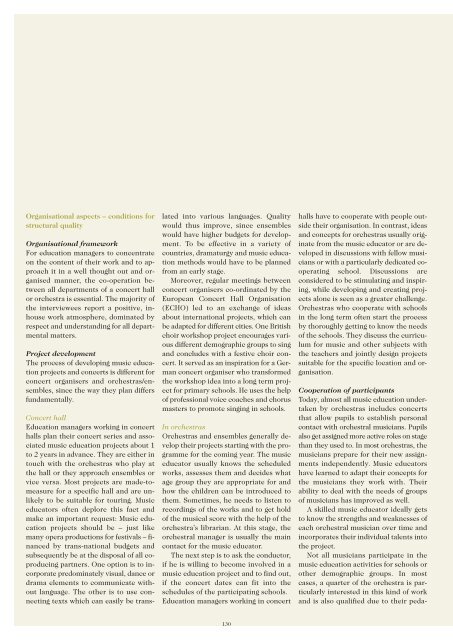exchange die kunst, musik zu vermitteln - Kunstdervermittlung.at
exchange die kunst, musik zu vermitteln - Kunstdervermittlung.at
exchange die kunst, musik zu vermitteln - Kunstdervermittlung.at
Erfolgreiche ePaper selbst erstellen
Machen Sie aus Ihren PDF Publikationen ein blätterbares Flipbook mit unserer einzigartigen Google optimierten e-Paper Software.
Organis<strong>at</strong>ional aspects – conditions for<br />
structural quality<br />
Organis<strong>at</strong>ional framework<br />
For educ<strong>at</strong>ion managers to concentr<strong>at</strong>e<br />
on the content of their work and to approach<br />
it in a well thought out and organised<br />
manner, the co-oper<strong>at</strong>ion between<br />
all departments of a concert hall<br />
or orchestra is essential. The majority of<br />
the interviewees report a positive, inhouse<br />
work <strong>at</strong>mosphere, domin<strong>at</strong>ed by<br />
respect and understanding for all departmental<br />
m<strong>at</strong>ters.<br />
Project development<br />
The process of developing music educ<strong>at</strong>ion<br />
projects and concerts is different for<br />
concert organisers and orchestras/ensembles,<br />
since the way they plan differs<br />
fundamentally.<br />
Concert hall<br />
Educ<strong>at</strong>ion managers working in concert<br />
halls plan their concert series and associ<strong>at</strong>ed<br />
music educ<strong>at</strong>ion projects about 1<br />
to 2 years in advance. They are either in<br />
touch with the orchestras who play <strong>at</strong><br />
the hall or they approach ensembles or<br />
vice versa. Most projects are made-tomeasure<br />
for a specific hall and are unlikely<br />
to be suitable for touring. Music<br />
educ<strong>at</strong>ors often deplore this fact and<br />
make an important request: Music educ<strong>at</strong>ion<br />
projects should be – just like<br />
many opera productions for festivals – financed<br />
by trans-n<strong>at</strong>ional budgets and<br />
subsequently be <strong>at</strong> the disposal of all coproducing<br />
partners. One option is to incorpor<strong>at</strong>e<br />
predomin<strong>at</strong>ely visual, dance or<br />
drama elements to communic<strong>at</strong>e without<br />
language. The other is to use connecting<br />
texts which can easily be trans-<br />
l<strong>at</strong>ed into various languages. Quality<br />
would thus improve, since ensembles<br />
would have higher budgets for development.<br />
To be effective in a variety of<br />
countries, dram<strong>at</strong>urgy and music educ<strong>at</strong>ion<br />
methods would have to be planned<br />
from an early stage.<br />
Moreover, regular meetings between<br />
concert organisers co-ordin<strong>at</strong>ed by the<br />
European Concert Hall Organis<strong>at</strong>ion<br />
(ECHO) led to an <strong>exchange</strong> of ideas<br />
about intern<strong>at</strong>ional projects, which can<br />
be adapted for different cities. One British<br />
choir workshop project encourages various<br />
different demographic groups to sing<br />
and concludes with a festive choir concert.<br />
It served as an inspir<strong>at</strong>ion for a German<br />
concert organiser who transformed<br />
the workshop idea into a long term project<br />
for primary schools. He uses the help<br />
of professional voice coaches and chorus<br />
masters to promote singing in schools.<br />
In orchestras<br />
Orchestras and ensembles generally develop<br />
their projects starting with the programme<br />
for the coming year. The music<br />
educ<strong>at</strong>or usually knows the scheduled<br />
works, assesses them and decides wh<strong>at</strong><br />
age group they are appropri<strong>at</strong>e for and<br />
how the children can be introduced to<br />
them. Sometimes, he needs to listen to<br />
recordings of the works and to get hold<br />
of the musical score with the help of the<br />
orchestra’s librarian. At this stage, the<br />
orchestral manager is usually the main<br />
contact for the music educ<strong>at</strong>or.<br />
The next step is to ask the conductor,<br />
if he is willing to become involved in a<br />
music educ<strong>at</strong>ion project and to find out,<br />
if the concert d<strong>at</strong>es can fit into the<br />
schedules of the particip<strong>at</strong>ing schools.<br />
Educ<strong>at</strong>ion managers working in concert<br />
130<br />
halls have to cooper<strong>at</strong>e with people outside<br />
their organis<strong>at</strong>ion. In contrast, ideas<br />
and concepts for orchestras usually origin<strong>at</strong>e<br />
from the music educ<strong>at</strong>or or are developed<br />
in discussions with fellow musicians<br />
or with a particularly dedic<strong>at</strong>ed cooper<strong>at</strong>ing<br />
school. Discussions are<br />
considered to be stimul<strong>at</strong>ing and inspiring,<br />
while developing and cre<strong>at</strong>ing projects<br />
alone is seen as a gre<strong>at</strong>er challenge.<br />
Orchestras who cooper<strong>at</strong>e with schools<br />
in the long term often start the process<br />
by thoroughly getting to know the needs<br />
of the schools. They discuss the curriculum<br />
for music and other subjects with<br />
the teachers and jointly design projects<br />
suitable for the specific loc<strong>at</strong>ion and organis<strong>at</strong>ion.<br />
Cooper<strong>at</strong>ion of participants<br />
Today, almost all music educ<strong>at</strong>ion undertaken<br />
by orchestras includes concerts<br />
th<strong>at</strong> allow pupils to establish personal<br />
contact with orchestral musicians. Pupils<br />
also get assigned more active roles on stage<br />
than they used to. In most orchestras, the<br />
musicians prepare for their new assignments<br />
independently. Music educ<strong>at</strong>ors<br />
have learned to adapt their concepts for<br />
the musicians they work with. Their<br />
ability to deal with the needs of groups<br />
of musicians has improved as well.<br />
A skilled music educ<strong>at</strong>or ideally gets<br />
to know the strengths and weaknesses of<br />
each orchestral musician over time and<br />
incorpor<strong>at</strong>es their individual talents into<br />
the project.<br />
Not all musicians particip<strong>at</strong>e in the<br />
music educ<strong>at</strong>ion activities for schools or<br />
other demographic groups. In most<br />
cases, a quarter of the orchestra is particularly<br />
interested in this kind of work<br />
and is also qualified due to their peda-


